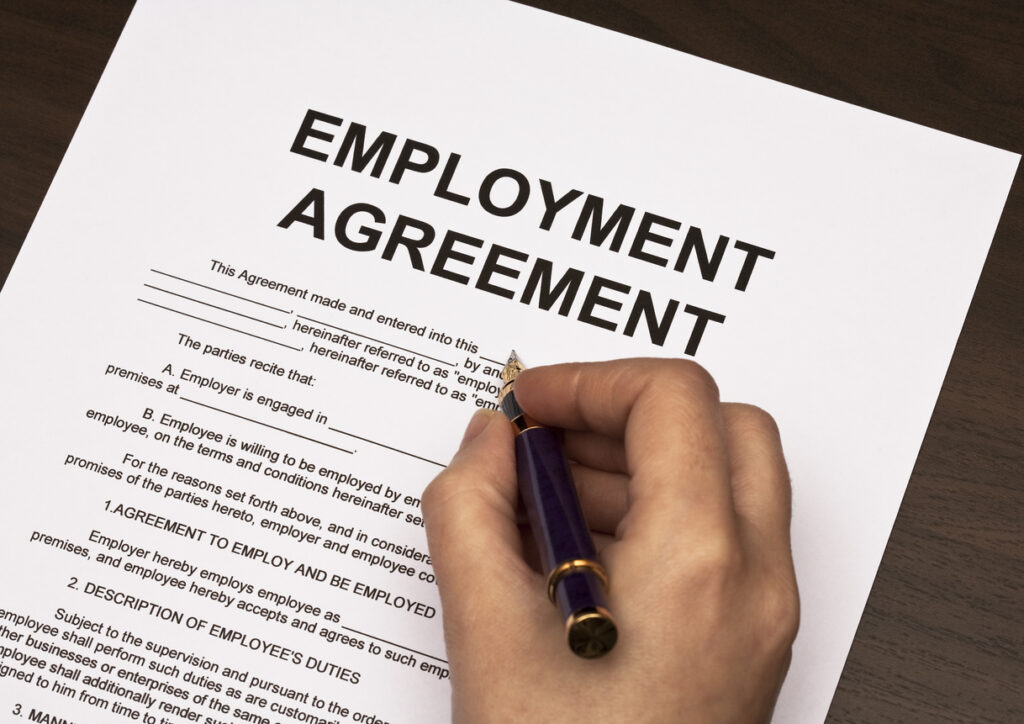Common Employment Law Disputes
The success of your business depends on the talent and hard work of your employees. However, working with employees can also represent a legal minefield. There are many situations where you can get into legal disputes with your employees, which can create an unhealthy working environment. Employment law disputes may be expensive, too – many small businesses may not have enough revenue and reserves to survive these types of disputes.
Due to the serious consequences associated with these types of disputes, it’s best to consult a lawyer beforehand to design contracts and procedures that will minimize the risk of trouble and put your business in a favorable position should an employment law dispute arise.

Discrimination
Discrimination disputes occur when an employee alleges mistreatment because they belong to a protected class, including:
- Race
- Gender
- Sexual orientation
- Disability
- Age
- Religion
Employers should understand and comply with federal and state anti-discrimination laws to avoid even the perception that they are discriminating against employees in these categories. This is one of the few situations where you might get into an employment dispute with someone who isn’t even an employee yet. It’s important to review your hiring practices and establish robust objective hiring criteria that you always adhere to and can cite if a potential employee claims discrimination.
It’s also important to monitor discourse in the workplace. If you permit the free use of sexist and racist language, these can make employees feel discriminated against whenever things don’t go their way and provide evidence of a discriminatory workplace in the event of a dispute.
Harassment
Harassment is when a person is subjected to hostile, insulting, or discriminatory treatment because of a protected category.
Sexual harassment is the most familiar type of harassment. It occurs when a person is subject to sexual comments, unwanted touch, or an expectation that they will provide sexual favors in exchange for promotions, raises, or other favorable treatment in the workplace.
However, people can claim harassment on the basis of other protected categories, so it’s important to control the workplace environment so that everyone feels safe, protected, and welcome.
It’s a good idea to establish a way for employees to bring up their concerns without going to a direct supervisor, who may potentially be the source of harassment.
Salary Disputes
As much as people might love their jobs and love working for you, everyone wants to get paid a fair salary for their labor. Getting paid is the main reason why people work in the first place, so it’s not a surprise that salary disputes are common.
People might dispute whether their salary conforms to federal, state, or municipal minimum wage laws. You will have to show that either their position isn’t covered by those laws or show that their salary actually does conform to the requirement.
People might also claim that they’re not being paid overtime properly. This is one of the most common wage disputes, and it comes up regularly. Make sure you know when your employees are entitled to overtime and be prepared to pay it when appropriate. When you discover that you’ve made a mistake and didn’t pay overtime when you should have, credit it to your employees before they start a dispute.
Employees might also allege that you haven’t calculated their salary properly. Listen to their complaint and check your math. This might be as simple as not understanding how your payroll software works – if you’re a small business owner, you’ve got a lot on your plate and mistakes happen. If it is an error on your part, admit the mistake and pay what’s owed.
Whenever there’s been a mistake in wages, check to see whether you might also owe your employees additional compensation such as interest to get compliant in the eyes of the law.
In addition to wages, people might dispute whether they are getting the benefits you promised. Make sure comprehensive education about benefits is part of your onboarding process. If people have questions, answer them in a non-confrontational environment.
Wrongful Termination
When you fire an employee, you need to make sure that you are complying with federal, state, and local laws. In particular, you need to make sure that you clearly document the reasons for termination so that you can show that an employee was fired for clear reasons that were made plain to them and not because they belong to a protected class.
One common allegation in wrongful termination disputes is that termination is in retaliation because a person is a whistleblower. If a person alleged fraud, unsafe conditions, or a discriminatory workplace, bringing their concerns to an outside authority, you must act very cautiously before you terminate them.

Noncompete and Nondisclosure Agreements
Noncompete agreements are intended to protect you from losing valuable expertise and knowledge when employees leave your company to go work for a competitor. These agreements have become very popular, but they are also highly contentious. Courts have given different verdicts on what terms are enforceable in noncompete contracts. Upcoming rule changes might make these agreements even harder to enforce.
A similar type of contract is a nondisclosure agreement, often called an NDA. These are also intended to protect your company’s secrets and are generally more enforceable.
In either case, it’s recommended that you work with a small business lawyer when drafting contracts to make sure they will function as intended.
Family and Medical Leave Act
The Family and Medical Leave Act (FMLA) is a well-intentioned but complicated piece of legislation that allows a lot of opportunities for misunderstanding. It’s very common for employers and employees to have different interpretations of what the law does and does not require of each party. As a result, it’s common for parties to allege a violation by the other party.
Work with a lawyer to understand the law and develop a clear brief for your employees so they understand the law, too. This will help head off any disputes.
An Employment Law Attorney Can Help You Avoid Disputes
Colorado employment law attorney Elizabeth Lewis understands that it’s much better for your business to avoid disputes than to try to resolve them once they arise. Since 2007, Elizabeth has been using her results-oriented approach to help small and medium-sized businesses succeed. This includes a diverse array of legal services, including employment law.
Elizabeth can help you and your employees understand the law so that you can avoid disputes. Once disputes arise, she can help you resolve them without having to resort to an expensive courtroom battle.
To learn how Elizabeth can help your business, please contact the Law Office of E. C. Lewis in Denver today.

